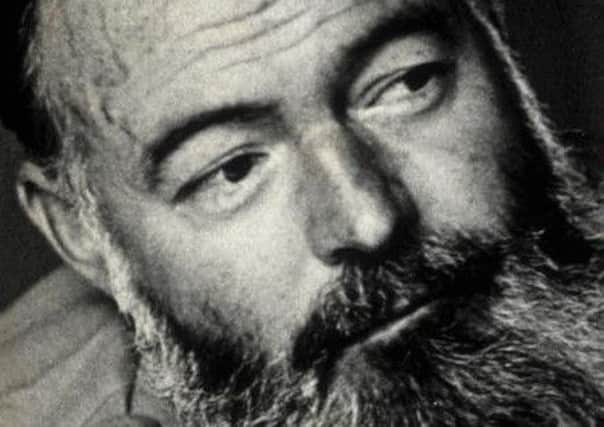Book review: Writer, Sailor, Soldier, Spy: Ernest Hemingway's Secret Adventures, by Nicholas Reynolds


In the 250 pages of this story (the remaining 100 pages give sources, notes and outline the key players) CIA historian Nicholas Reynolds takes us through eight countries, three wars and a revolution. The pace is breathtaking, and that’s the effect Reynolds wants to achieve, because it is how Ernest Hemingway lived his life – certainly the last 26 years of his life, which are the span of this book.
It begins in 1935, when Hemingway was already a famous author and enjoying being with his young family, writing and fishing in Key West, Florida, his adopted home. The deaths of many First World War veterans working on New Deal building projects on the Keys in the devastating hurricane that year affected him deeply. He turned against Roosevelt’s economic and social policies, and his passionate articles in journals such as the Daily Worker were noted in Moscow.
Advertisement
Hide AdNow focusing his writing on political journalism, within months he was filing reports and features from the civil war in Spain, and was embedded as a correspondent with the Soviet-supported International Brigades. He was invited to observe military training at a secret Soviet training camp and, according to Reynolds, in 1940 was deliberately targeted by the NKVD, the forerunner of the KGB, to spy for the USSR. It must be said that the evidence for this claim, although convincingly deployed, is circumstantial, and when describing the recruitment, Reynolds is careful to use terms like “probably”, “may”, “would likely” and “might have”.
The source of the recruitment claims is Alexander Vassiliev, a former KGB officer who, when the Soviet Union collapsed, was tasked by his bosses to read old NKVD and KGB files and share his notes with Western historians. All well and good, but what neither we nor Nicholas Reynolds can do is check the original files. We do know that the sharing was a commercial arrangement between a KGB faction and a publishing group, that it did not raise as much money for the KGB pension fund as was intended, and that the KGB officers who devised the project were eventually sidelined. There is no real evidence to say, as Reynolds does, that Ernest Hemingway “signed on” with the NKVD, although there is evidence to suggest that Hemingway was a fellow traveller with the communists, and it is true that the alleged recruiter, Jacob Golos, did succeed in enlisting other Americans to spy for the Soviet Union.
But this alleged treachery is only one theme of Reynolds’s book. There is apt reference to Hemingway’s novels and short stories throughout and the book is full of anecdotes and quips about his adventuring, drinking and womanising.
Reynolds also reveals Hemingway’s practical contributions to the defeat of Nazism. In collaboration with the US Embassy in Havana, early in the Second World War, he set up a spy ring, “the Crook Factory”, from his home in Cuba. He also armed his 38-foot fishing boat, Pilar, with submachine guns, bazookas and hand grenades to attack any Nazi U-boats he and his crew might spot in the Caribbean.
On the fields of battle, in Spain and in France and Belgium during the Second World War, Hemingway the war correspondent was often at the centre of military action, assisting and protecting soldiers who were under orders to protect him; senior officers sought out and enjoyed his company.
Once the war was over, however, Hemingway’s problems multiplied. He suffered serious injuries in two plane crashes and was prey to a range of physical and mental illnesses. He was a supporter of Fidel Castro, but abandoned his Cuban home after President Kennedy’s botched CIA invasion. Typically, Hemingway chose a shotgun for his suicide in 1961. Readers of this book will be aware that his premature death “probably” prevented a political past catching up with him.
Writer, Sailor, Soldier, Spy: Ernest Hemingway’s Secret Adventures, by Nicholas Reynolds, is published by William Morrow, £20